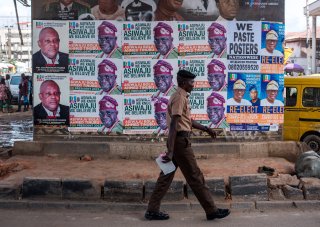Can Nigeria’s New Government Address Its Growing Security Challenges?
There is an opportunity for the U.S. to be a more active and public partner to Nigeria and West Africa.
Editor’s Note: The authors met with Nigerian minister of defense Mohammed Badaru on his recent visit to Washington, DC to discuss China, governance, and sustainable solutions to security.
The United States and the international community closely watch Nigerian president Bola Tinubu navigate his new tenure over the Nigerian state and the Economic Community of West African States (ECOWAS). Having come into office only six months ago, Tinubu inherited a precarious security situation, primarily fueled by the notorious Boko Haram insurgency. The extremist group, founded in 2002, seeks to establish an Islamic state in the region and has perpetrated numerous heinous acts, including abductions, bombings, and massacres. Despite concerted efforts by subsequent Nigerian governments and international partners, eradicating the threat remains elusive. Additionally, regional complexities, ethnic tensions, and economic disparities exacerbate the situation. The humanitarian toll is staggering, with widespread displacement and loss of life.
In 2022, 48 percent of all terrorism deaths worldwide occurred in Sub-Saharan Africa. Niger and Gabon, neighboring and smaller West African countries, were the latest in a line of military overthrows, being referred to as a contagion of coups.
In its historical role as big brother, Nigeria is expected to play a big part in stabilizing the region and the continent. Nigeria must prioritize policies focusing on inclusive governance at home and in its leadership to stabilize the region effectively.
U.S. concern over Africa’s engagement with great power competitors Russia and China is evident, and Minister of Defense Mohammed Badaru clearly responded that, ultimately, relations “depend on mutual understanding and diplomacy.” China is a crucial partner to a number of African states, including Nigeria, in railway expansion, and as an alternate military equipment partner. Is Tinubu’s administration more than an opening for the United States to circle competing Russian and Chinese influence? Arguably, there is an opportunity to be a more active and public partner to Nigeria and West Africa to turn the tables on damaging and unsustainable security strategies.
Inclusive governance, prioritizing the national government to work closer with state governments, is vital in Nigeria. The complexity of Nigeria’s security situation lies in its variation across its six geopolitical zones. Locally led, or in this case, state government-led engagement and implementation of security policies accomplish three things: mitigating grievances and skirmishes that are exacerbated by being targeted or ignored (when blanket national policies do not address the nuances of varied security issues), allowing for state-national and development-security policies to support each other, and adding a layer of oversight and accountability.
Inclusive governance is the most direct and sustainable response to mend instability in Sub-Saharan Africa. In prioritizing this approach, states address the nonstate (terrorism) and state (democratic backsliding) aspects. The defense minister’s experience as a state governor may be essential to greater counterterrorism and stability gains for Nigeria, “With the experience I have as a governor, now as a minister of defense, I can be able to sort things out to make sure that some actions and reforms must be taken to ensure that Nigeria be free of all types of insecurity...Now, as the minister of defense, I am the authority.” U.S.-Nigerian relations are historically built on might and muster, but there is an opportunity for a more integrated and sustainable strategy moving forward.
The Global Fragility Act has highlighted five coastal West African states as key to addressing these challenges; these West African states must lean into Nigeria and ECOWAS, and the United States and its partners should support both bilateral and regional responses to mitigate instability and conflict.
The United States can be a partner to the political will and comprehensive planning displayed by Tinubu’s administration and pursue inter-level integration of U.S. assistance. In 2022, the United States contributed $355 million in humanitarian assistance to the West African power. During the Nigerian delegation’s visit to Washington last week, Nigerian officials viewed military equipment they hope to receive as part of the U.S.-Nigerian bilateral defense cooperation that they have enjoyed since 2016. The question is whether the United States will pursue a more comprehensive bilateral arrangement that better matches Tinubu and Badaru’s stated comprehensive strategy.
Tammy Palacios is a Senior Analyst leading the Priority Sustainable Counterterrorism initiative at the New Lines Institute. Palacios previously served as Program Head for the Nonstate Actors program at New Lines, where she worked in the field of violent and non-violent nonstate actors.
Dr. Azeem Ibrahim is a Director at the Newlines Institute for Strategy and Policy in Washington DC and a Research Professor at the Strategic Studies Institute U.S. Army War College.
Image: Shutterstock.com.

